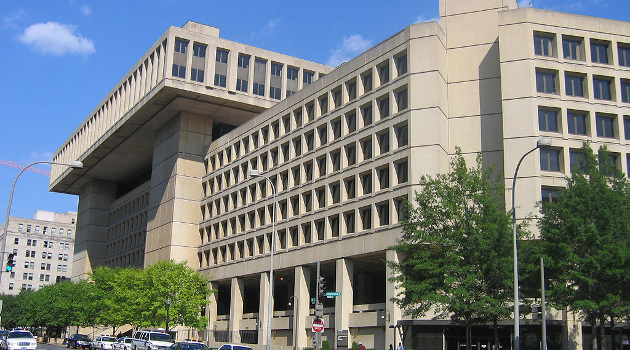I’m not a fan of federal bureaucracies and I don’t like the undeserved wealth of the Washington, DC metro region.
So I’m very open to ideas that would address these problems.
Paul Kupiec of the American Enterprise Institute suggests, in a thought-provoking column in the Wall Street Journal, that one possible solution would be to move federal bureaucracies out of Washington.
Donald Trump pledged to rebuild America’s troubled inner cities, “drain the swamp,” and restore Americans’ confidence in their government. The president-elect can deliver on these promises by moving federal government agencies out of the nation’s capital and closer to the citizens they serve in cities like Detroit, Cleveland or Milwaukee.
He points out that two bureaucracies are currently looking to build new headquarters.
The FBI’s current headquarters, the J. Edgar Hoover Building, was built in 1975. It is now too small to meet the FBI’s needs, and it requires major repairs. The specifications for a new FBI headquarters include 2.1 million square feet of office space with access to adequate transportation. The construction budget alone is about $2.5 billion. …The Labor Department is also looking for a new headquarters… The new building could be as large as 1.4 million square feet and, if costs are similar to those proposed by the FBI, the building budget alone would exceed $1 billion.
So why, he asks, don’t we locate those headquarters in places that would benefit from federal redistribution?
…consider what relocating the FBI headquarters to Detroit would do. Moving 11,000 FBI employees would hardly make a dent in the D.C. economy. Over 275,000 people—over 14% of the workforce—are federal-government employees, according to the Office of Personnel Management. In contrast, 11,000 well-paid federal government jobs and $2.5 billion in construction spending would provide a significant boost to the Detroit economy, where less than 2% of the workforce are federal employees.
Here’s the basic argument.
With modern communications technology, there is no reason that the FBI’s new headquarters, or the headquarters of other federal government agencies, must be located in the nation’s capital. The concentration of federal agencies in a single area increases the potential for a breakdown of government services in the event of a terrorist attack… Reducing risk is but one benefit. It would also be healthy for the country to more broadly distribute the wealth and power of federal-government agencies across the nation.
And Kupiec points out that it’s not fair that the DC-metro region gains such disproportionate benefits from overpaid bureaucrats and fat-cat consultants.
According to the 2010 U.S. Census, 11 of the 20 richest U.S. counties—including the three richest counties—are in the Washington, D.C., metro area. Incomes near the national capital are bloated not only by generous federal-government payrolls, but also by “Beltway bandit” consultancy firms that provide contract services to federal agencies. It is little wonder that many Americans view the federal government as a money machine for bureaucrats and political insiders.
Here’s the most persuasive argument for moving government departments to other spots in America.
Taxpayers would save money if bureaucracies were built and operated outside of DC.
Many towns and cities across America would welcome the economic development and stability that accompanies a well-paid federal-agency workforce like the FBI or the Labor Department. The expense of managing the federal government should be used to spread wealth beyond the nation’s capital and revitalize the economies of America’s ailing cities. Moving agencies out of Washington will also save millions of dollars because the costs of acquisition, building maintenance and housing for federal employees will shrink outside of the Washington bubble. In 2016 federal employees in the D.C. area receive a 24.78% premium over the base federal pay scale because they work in a high-cost region, according to the Office of Personnel Management.
Part of me likes this idea, especially since the burden on taxpayers presumably would decrease.
But I confess to being conflicted on the issue. Here are my concerns.
- Shouldn’t we focus on shutting down counterproductive bureaucracies rather than moving them? Whether based in Detroit or DC, departments such as HUD, Agriculture, Energy, Education, and Transportation shouldn’t exist.
- If we move bureaucracies (whether they are necessary ones or useless ones), does that create the risk of giving other parts of the nation a “public-choice” incentive to lobby for big government since they’ll be recipients of federal largesse?
- Will we simply get duplication, meaning a new bureaucracy somewhere in America without ever really getting rid of the original bureaucracy in Washington, DC?
Though maybe if I was in charge of the process, it wouldn’t be a bad idea.
I could locate some bureaucracies in the dodgy parts of cities such as Detroit. Especially departments such as HUD and HHS since they helped cause the economic misery in inner cities.
And the Department of Education could be placed somewhere like Newark where government-run schools are such awful failures.
As for other federal bureaucracies, I’m wondering whether seasonal switches would be possible? Maybe stick them in North Dakota in the winter and Brownsville, Texas, in the summer?
Any ideas from readers on this libertarian quandary?
———
Image credit: Aude | CC BY-SA 3.0.

